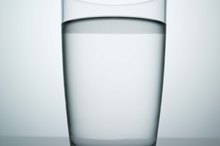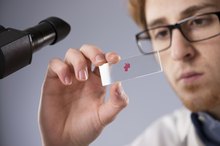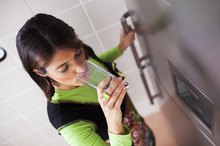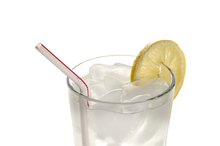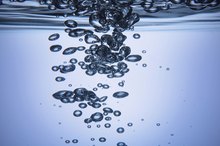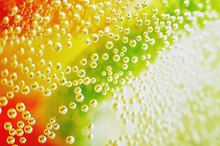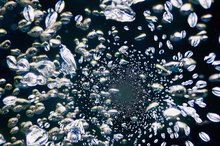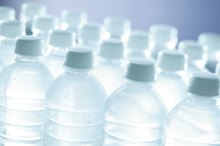What does fact checked mean?
At Healthfully, we strive to deliver objective content that is accurate and up-to-date. Our team periodically reviews articles in order to ensure content quality. The sources cited below consist of evidence from peer-reviewed journals, prominent medical organizations, academic associations, and government data.
- "Journal of General Internal Medicine"; Comparison of the Mineral Content of Tap Water and Bottled Waters; 2001
- "Journal of General Internal Medicine"; Comparison of the Mineral Content of Tap Water and Bottled Waters; 2001
- "Journal of Water Health"; Bottled Water Versus Tap Water: Understanding Consumers Preferences; 2006
- "Journal of Water Health"; Bottled Water Versus Tap Water: Understanding Consumers Preferences; 2006
The information contained on this site is for informational purposes only, and should not be used as a substitute for the advice of a professional health care provider. Please check with the appropriate physician regarding health questions and concerns. Although we strive to deliver accurate and up-to-date information, no guarantee to that effect is made.
Does Tap Water Have More Minerals Than Filtered Water?
Tap water can contain more minerals than filtered water, with the mineral content in tap water varying by city and source 1. Drinking tap water from mineral-rich sources can help you meet a fraction of the dietary reference intake for important minerals like calcium and magnesium. Filtering water removes the majority of these minerals.
Calcium
You may not think of tap water as being a good source of calcium, but it can be if you drink enough of it. According to the "Journal of General Internal Medicine," a study published by researchers at McGill University in March 2001 affirmed that drinking 2 liters of tap water in some cities can fulfill between 6 percent and 18 percent of your recommended daily allowance of calcium 1. Furthermore, according to a study published by a French research team in "Osteoporosis International" in 2002, the calcium in water can be as readily absorbed in the body as calcium from dairy foods. In comparison, filtered water contains much less calcium -- from 6 to 18 mg per liter of calcium.
- You may not think of tap water as being a good source of calcium, but it can be if you drink enough of it.
- According to the "Journal of General Internal Medicine," a study published by researchers at McGill University in March 2001 affirmed that drinking 2 liters of tap water in some cities can fulfill between 6 percent and 18 percent of your recommended daily allowance of calcium 1.
Magnesium
The Disadvantages of Drinking Distilled Water
Learn More
Tap water can also be a clinically significant source of magnesium, another mineral essential to the human body. Magnesium supports blood cell turnover and the immune system. According to the study published in 2002 in the "Journal of General Internal Medicine" drinking 2 liters of tap water provides between 16 percent and 31 percent of the recommended daily allowance of magnesium 1. The same study found that filtered water provides much less magnesium, from 3 to 8 mg per liter of magnesium.
- Tap water can also be a clinically significant source of magnesium, another mineral essential to the human body.
- The same study found that filtered water provides much less magnesium, from 3 to 8 mg per liter of magnesium.
Sodium
Your cardiac and nervous systems need sodium to function properly, but too much sodium can be detrimental to your health, leading to hypertension. The U.S. Department of Agriculture Dietary Guidelines for Americans states that normal, healthy adults need from 2,400 to 3,000 mg of sodium daily. Tap water can be a very modest source of sodium, with North American tap water having in the range of 18 to 41 mg per liter of sodium. In comparison, filtered bottled water contains sodium in the range of 4 to 8 mg per liter 1.
Consumer Preference
What Is the Most Abundant Electrolyte Found in Blood Plasma?
Learn More
Filtered water is a big industry, with sales in the billions of dollars annually. According to a study by English researchers at the University of Anglia, published in 2006 in the "Journal of Water Health," consumers prefer bottled water because of health concerns and because of dissatisfaction with the taste of tap water 2. Preference for tap water also varies by demographics, perceived quality of the tap water, and trust in tap water companies. Reusable water filters make it possible for households to filter their own tap water at home without purchasing commercial bottled water.
- Filtered water is a big industry, with sales in the billions of dollars annually.
- Reusable water filters make it possible for households to filter their own tap water at home without purchasing commercial bottled water.
Purified Water
Minerals are removed from commercially sold purified waters by one of several processes, including distillation, reverse-osmosis and deionization. Purified water is also known as "demineralized water," "deionized water," "distilled water," and "reverse osmosis water."
Mineral-Rich Bottled Water
The FDA distinguishes among five types of bottled water: artesian water, spring water, mineral water, sparking mineral water and purified water. Bottled water labeled "mineral water" must contain no less than 250 parts per million of dissolved solids, and cannot have added minerals. Some mineral waters, especially European varieties, have higher concentrations of calcium, magnesium, and sodium. Check the nutrition label to verify the mineral content.
- The FDA distinguishes among five types of bottled water: artesian water, spring water, mineral water, sparking mineral water and purified water.
Related Articles
References
- "Journal of General Internal Medicine"; Comparison of the Mineral Content of Tap Water and Bottled Waters; 2001
- "Journal of Water Health"; Bottled Water Versus Tap Water: Understanding Consumers Preferences; 2006
- Rosario-Ortiz F, Rose J, Speight V, Von Gunten U, Schnoor J. How do you like your tap water?. Science. 2016;351(6276):912-914. doi:10.1126/science.aaf0953
- National Resource Defense Council. Bottled water: Pure drink or pure hype?. Updated February 1999.
- Centers for Disease Control and Prevention. Bottled water. Basics. Updated April 2014.
- Centers for Disease Control and Prevention. Camping, hiking, travel. Updated February 2018.
- Kim SK, Park SW, Kang SM, Kwon HK, Kim BI. Assessment of the erosive potential of carbonated waters. J Korean Acad Oral Health. 2015;39(4):273-279. doi:10.11149/jkaoh.2015.39.4.273
- Quattrini S, Pampaloni B, Brandi ML. Natural mineral waters: chemical characteristics and health effects. Clin Cases Miner Bone Metab. 2016;13(3):173-180. doi:10.11138/ccmbm/2016.13.3.173
- James LJ, Mattin L, Aldiss P, Adebishi R, Hobson RM. Effect of whey protein isolate on rehydration after exercise. Amino Acids. 2014;46(5):1217-1224. doi:10.1007/s00726-014-1680-8
- Fleming N, Vaughan J, Feeback M. Ingestion of oxygenated water enhances lactate clearance kinetics in trained runners. J Int Soc Sports Nutr. 2017;14(1):9. doi:10.1186/s12970-017-0166-y
- Cleveland Clinic. Electrolyte drinks: Beneficial or not?. Updated April 2019.
- Li L, Seeram NP. Further investigation into maple syrup yields 3 new lignans, a new phenylpropanoid, and 26 other phytochemicals. J Agric Food Chem. 2011;59(14):7708-7716. doi:10.1021/jf2011613
- Kalman DS, Feldman S, Krieger DR, Bloomer RJ. Comparison of coconut water and a carbohydrate-electrolyte sport drink on measures of hydration and physical performance in exercise-trained men. J Int Soc Sports Nutr. 2012;9(1):1. doi:10.1186/1550-2783-9-1
- Cleveland Clinic. Alkaline water: Don’t believe the marketing hype. Updated October 2013.
- Weidman J, Holsworth RE, Brossman B, Cho DJ, Cyr JS, Fridman G. Effect of electrolyzed high-pH alkaline water on blood viscosity in healthy adults. J Int Soc Sports Nutr. 2016 Dec 1;13(1):45. doi:10.1186/s12970-016-0153-8
- Mumme K, Stonehouse W. Effects of medium-chain triglycerides on weight loss and body composition: a meta-analysis of randomized controlled trials. J Acad Nutr Diet. 2015;115(2):249-263. doi:10.1016/j.jand.2014.10.022
- Cleveland Clinic. Hydration. Updated May 2019.
Writer Bio
Janelle Commins started writing professionally in 2007. She has written for the "UCLA Total Wellness" magazine on nutrition and fitness topics that are of interest to young adults. Her work has also appeared in various online publications. She holds a Bachelor of Science in nutrition science from University of California, Davis, and a Master of Science in public health from University of California, Los Angeles.
